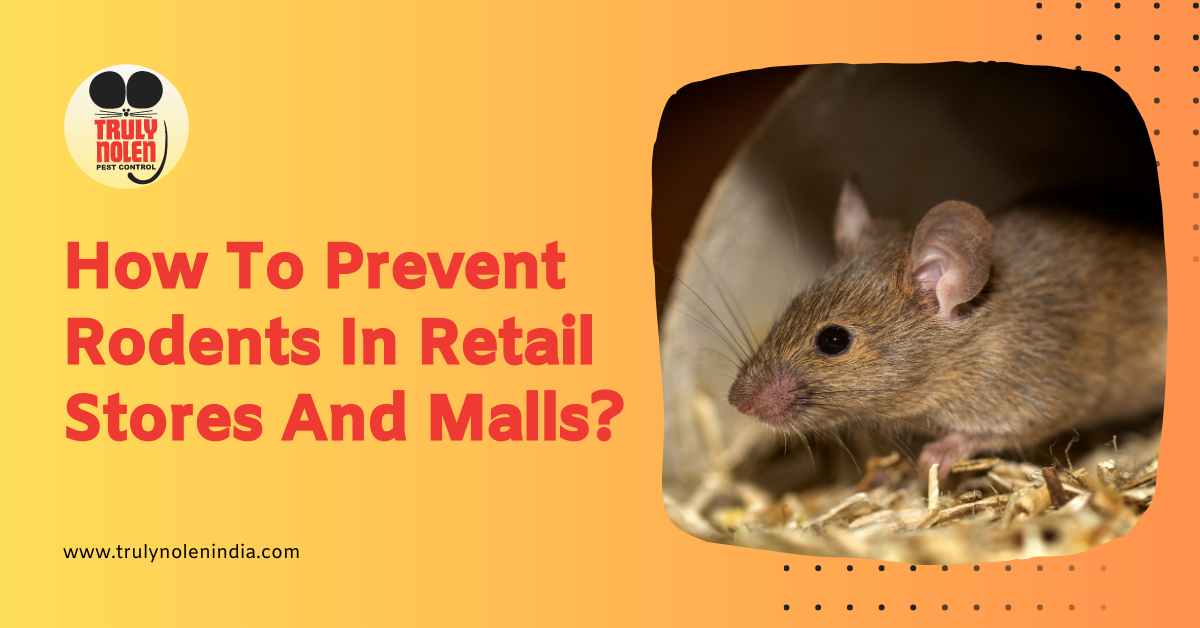Rodents like rats and mice can wreak havoc in retail stores and malls, posing severe threats to cleanliness, safety, and customer satisfaction. These pests can damage merchandise, contaminate food products, and even lead to health code violations.
Therefore, it is crucial for businesses in the retail industry to take proactive measures to prevent rodent infestations. Understanding the reasons behind rodent infestations, their detrimental effects, and implementing effective prevention strategies is crucial for business owners.
In this blog, we will discuss how to prevent rodents in retail stores and malls, ensuring a clean and safe environment for your customers and employees.
Why Do Rodents Infest Retail Stores And Malls?
Before learning how to prevent rodents in retail stores and malls let us have a look at the reasons they infest retail stores and malls. Rodents infest retail stores and malls due to:
- Abundance of Food: These establishments offer a wide range of food options, including grocery stores, restaurants, and food courts, providing rodents with a readily available food supply.
- Shelter and Warmth: Retail stores and malls provide a controlled indoor environment that offers warmth and shelter, attracting rodents seeking a safe place to live and reproduce.
- Water Availability: Plumbing systems, water fountains, and leaking pipes in these establishments can serve as water sources for rodents, fulfilling their hydration needs.
- Easy Access: Rodents can exploit small cracks, gaps, and openings in walls, floors, and ceilings to gain entry into retail stores and malls.
- Hiding Places: The presence of storage areas, stacked merchandise, and cluttered spaces within these establishments offers rodents ample hiding spots during the day.
To prevent rodents in retail stores and malls, it is essential to eliminate food sources, seal entry points, address water leaks, and maintain a clean and organized environment.
What Are The Signs Of Rodents In Retail Stores And Malls?

It is important to understand the signs of infestation before addressing the issue of ‘how to prevent rodents in retail stores and malls.’ Signs of rodents in retail stores and malls:
- Droppings: Rodents leave behind small, dark droppings near their feeding and nesting areas, such as storage rooms, kitchens, or behind shelves.
- Gnaw marks: Look for gnaw marks on food packaging, wires, and structural materials, especially in hidden or less frequently visited areas.
- Tracks: Rodents often leave footprints or tail marks in dusty or less disturbed areas, providing visual evidence of their presence.
- Nests: Rodents build nests using shredded materials, such as paper, fabric, or insulation. Check hidden corners, storage areas, and behind equipment for nests.
- Unusual smells: A strong, musty odor can indicate the presence of rodent urine or nesting materials.
Why Is It Important To Prevent Rodents In Retail Stores And Malls?
Preventing rodents in retail stores and malls is crucial for several reasons:
1. Health and Safety
- Rodents carry diseases and parasites that can contaminate food products, surfaces, and packaging, posing severe health risks to employees and customers.
- Preventing rodents is essential to safeguard everyone’s health and safety by minimizing the risk of foodborne illnesses and transmission of diseases like Salmonellosis, Hantavirus, Lassa Fever, and Leptospirosis.
2. Reputation and Customer Experience
- Rodent sightings or evidence of rodent activity can quickly spread through word-of-mouth and online reviews, negatively impacting a business’s reputation.
- Preventing rodents in retail stores and malls is crucial for preserving a positive reputation and providing a pleasant shopping experience that meets customers’ expectations of cleanliness and safety.
3. Product and Property Damage
- Rodents’ gnawing behavior can cause significant damage to merchandise, packaging, electrical wires, insulation, and the building’s structure.
- Preventing rodent infestations helps protect businesses’ assets, minimizing the need for costly repairs or replacements of damaged goods and infrastructure.
4. Regulatory Compliance
- Health and safety regulations require retail stores and malls to maintain a clean and pest-free environment.
- Implementing effective rodent prevention measures ensures compliance, avoiding potential fines, legal consequences, or closure orders.
5. Employee Morale and Productivity
- Rodents’ presence can create an uncomfortable and unsafe working environment, negatively impacting employee morale and productivity.
- By prioritizing rodent prevention, businesses can foster a positive work atmosphere that supports employee well-being, job satisfaction, and productivity.
6. Cost Savings
- Rodent infestations result in financial losses from repairing damaged products and infrastructure and hiring pest control services.
- Proactively preventing rodents helps businesses avoid these costly repercussions and allocate resources more effectively.
7. Preventing Secondary Pest Infestations
- Rodents can attract secondary pests like fleas, ticks, and mites, further complicating the situation and posing additional health risks.
- Preventing rodent infestations minimizes the likelihood of secondary pest problems, maintaining a clean and safe environment for employees and customers.
By prioritizing proactive measures and effective prevention strategies, businesses can avoid the negative consequences of rodent infestations.
How To Prevent Rodents In Retail Stores And Malls?

1. Maintain Cleanliness and Hygiene
The first line of defense against rodents is to maintain a clean and hygienic environment. Regularly sweep and mop floors, paying close attention to corners and hidden areas. Keep garbage areas clean and ensure that trash is properly stored in sealed containers. Promptly dispose of any damaged or spoiled goods that may attract rodents. Additionally, establish a strict cleaning schedule to ensure consistent upkeep of the premises.
2. Seal Entry Points
Rodents can enter your store or mall through even the tiniest gaps and openings. Conduct a thorough inspection of your property to identify potential entry points. Seal any cracks, holes, or gaps in walls, floors, windows, and doors using appropriate materials such as steel wool or caulk. Pay special attention to utility openings, vents, and drains, as these are common entry points for rodents
3. Implement Proper Waste Management
Proper waste management is crucial for preventing rodent infestations. Ensure that dumpsters and waste storage areas are well-maintained, clean, and secure. Regularly empty dumpsters, and make sure they have tight-fitting lids to prevent rodents from accessing the contents. Consider using rodent-proof garbage bins or compactors, which can significantly reduce the chances of attracting pests
4. Store Food Properly
Proper food storage is vital in deterring rodents if your retail store or mall includes food establishments or stores. Store food products in sealed containers or packaging that rodents cannot easily access. Ensure that shelves and storage areas are clean and organized, minimizing hiding places for rodents. Implement a “first in, first out” policy to prevent accumulating old or expired food items
5. Maintain Landscaping
Trim trees, bushes, and shrubs near the building to discourage rodents from nesting or accessing the premises. Remove any debris, such as piles of leaves or wood, which can provide hiding places for rodents
6. Educate and Train Staff
Your employees play a crucial role in preventing rodent infestations. Educate them about the signs of rodent activity, such as droppings, gnaw marks, and strange noises. Train them on proper cleanliness practices, waste management protocols, and the importance of promptly reporting any potential issues. Encourage an open line of communication so that your staff feels comfortable reporting any signs of rodent activity.
7. Monitor and Act Swiftly
Regular monitoring is crucial to promptly identify and address any signs of rodent activity. Install surveillance cameras in key areas to monitor rodent movement or entry attempts. Train your staff to be vigilant and report any sightings or evidence of rodents immediately. Act swiftly to address the issue, whether it involves setting traps, increasing pest control measures, or implementing additional preventive actions.
8. Implement Pest Control Measures
Regular pest control inspections and treatments are essential for preventing rodent infestations. Consider partnering with a professional pest control company that specializes in commercial settings. They can provide tailored solutions, including routine inspections, preventive treatments, and ongoing monitoring to ensure early detection of any signs of rodent activity.
In conclusion, preventing rodents in retail stores and malls is crucial for maintaining a clean and safe environment for both customers and employees. By implementing a comprehensive rodent control strategy that combines proper sanitation practices, regular inspections, effective exclusion measures, and professional pest management services, businesses can minimize the risk of rodent infestations and the associated damages they can cause.
By prioritizing prevention and taking proactive measures, retail stores and malls can create a pleasant shopping experience while safeguarding their reputation and ensuring the well-being of everyone within their premises. Remember, a rodent-free environment is not only beneficial for business success but also essential for upholding health and safety standards.
Stop Rodents From Nibbling Away Your Profits With Truly Pest Solution!

Truly Pest Solution is the answer when it comes to preventing rodents in retail stores and malls. Our experts follow a systematic approach for Truly Pest Solution’s Intelligent Rodent Proofing Service:
Step 1 – Inspection:
Thoroughly inspect your premises to identify rodent activity and entry points.
Step 2 – Identification:
Determine the root causes of infestation, including food sources and vulnerabilities.
Step 3 – Determination:
Based on the inspection findings, create a customized plan to address the rodent problem.
Step 4 – Prevention:
Implement measures like sealing entry points, installing monitoring systems, and using deterrents.
Step 5 – Communication:
Maintain open lines of communication, providing updates and recommendations throughout the process.
With our experts leading the way, Truly Pest Solution ensures effective, hassle-free, eco-friendly pest control in retail stores and malls.
Contact us to book a free inspection today!


Leave a Reply